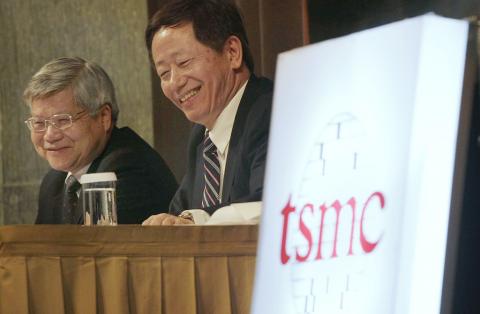Taiwan Semiconductor Manufacturing Co (TSMC, 台積電) yesterday forecast better-than-expected sequential growth of 22 percent in revenue this quarter after the world’s top contract chipmaker posted a quarterly net profit that beat analysts’ expectations, fueled by resilient smartphone demand.
Revenue is expected to swell to between NT$180 billion and NT$183 billion (US$5.97 billion and 6.07 billion) in the current quarter, compared with NT$148.22 billion last quarter, with the strongest growth from the communications segment, TSMC chief financial executive officer Lora Ho (何麗梅) said.
The “unseasonably strong” growth cited by TSMC exceeds the 15 percent sequential expansion estimated by Credit Suisse analyst Randy Abrams. He forecast that TSMC’s revenue would expand to NT$169 billion this quarter.

Photo: Reuters / Pichi Chuang
Abrams retained his “outperform” rating on TSMC with a target price of NT$130.
“Since mid-January, we started to see strong orders across all segments. We now adjust our demand outlook,” TSMC co-CEO Mark Liu (劉德音) said. “First, the demand for smartphones appears healthier than we expect. Second, our 28-nanometer technology’s performance and quality have helped fuel more customer demand.”
As inventory for chip designers remains lower this quarter than the typical seasonal level, “we expect that our demand will continue to be strong and above seasonal [norms] in all major regions,” Liu said.
Liu said the company would also see positive sequential growth in the third and fourth quarters, but the growth would “be normal and be more moderate than the second quarter,” as customers’ inventory would return to seasonal levels in the middle of this year, he said.
TSMC said it is to ship a high volume of 20-nanometer chips in the second half of this year and start mass production of next-generation 16-nanometer chips next year as scheduled.
The company expects the global semiconductor industry to see revenue grow by 7 percent annually this year, compared with a 5 percent increase estimated three months ago, and chip designers would see revenue rise by 9 percent annually from 8 percent previously forecast, Liu said.
The chip foundry industry would expand revenue by 14 percent this year, up from an earlier 10 percent prediction, Liu said. TSMC’s revenue growth this year would outpace the rest of the industry by several percentage points, he said.
During the quarter ending March 31, TSMC’s net profit expanded 6.8 percent to NT$47.87 billion, or NT1.85 per share, compared with NT$44.81 billion, or NT$1.73 per share, in the fourth quarter of last year. On an annual basis, the figure represented a growth of 21 percent.
Gross margin improved to 47.5 percent last quarter from 44.5 percent in the fourth quarter of last year, while operating profit margin rose to 35.4 percent from 32.8 percent.
This quarter, TSMC expects gross margin to climb to between 47.5 percent and 49.9 percent, while operating profit will rise to between 36.5 percent and 38.5 percent.
Liu said revenue contribution from high-end smartphones would rise to US$14 per unit this year, from US$10.8 last year.

Chizuko Kimura has become the first female sushi chef in the world to win a Michelin star, fulfilling a promise she made to her dying husband to continue his legacy. The 54-year-old Japanese chef regained the Michelin star her late husband, Shunei Kimura, won three years ago for their Sushi Shunei restaurant in Paris. For Shunei Kimura, the star was a dream come true. However, the joy was short-lived. He died from cancer just three months later in June 2022. He was 65. The following year, the restaurant in the heart of Montmartre lost its star rating. Chizuko Kimura insisted that the new star is still down

While China’s leaders use their economic and political might to fight US President Donald Trump’s trade war “to the end,” its army of social media soldiers are embarking on a more humorous campaign online. Trump’s tariff blitz has seen Washington and Beijing impose eye-watering duties on imports from the other, fanning a standoff between the economic superpowers that has sparked global recession fears and sent markets into a tailspin. Trump says his policy is a response to years of being “ripped off” by other countries and aims to bring manufacturing to the US, forcing companies to employ US workers. However, China’s online warriors

Application-specific integrated circuit designer Faraday Technology Corp (智原) yesterday said that although revenue this quarter would decline 30 percent from last quarter, it retained its full-year forecast of revenue growth of 100 percent. The company attributed the quarterly drop to a slowdown in customers’ production of chips using Faraday’s advanced packaging technology. The company is still confident about its revenue growth this year, given its strong “design-win” — or the projects it won to help customers design their chips, Faraday president Steve Wang (王國雍) told an online earnings conference. “The design-win this year is better than we expected. We believe we will win

Intel Corp chief executive officer Lip-Bu Tan (陳立武) is expected to meet with Taiwanese suppliers next month in conjunction with the opening of the Computex Taipei trade show, supply chain sources said on Monday. The visit, the first for Tan to Taiwan since assuming his new post last month, would be aimed at enhancing Intel’s ties with suppliers in Taiwan as he attempts to help turn around the struggling US chipmaker, the sources said. Tan is to hold a banquet to celebrate Intel’s 40-year presence in Taiwan before Computex opens on May 20 and invite dozens of Taiwanese suppliers to exchange views